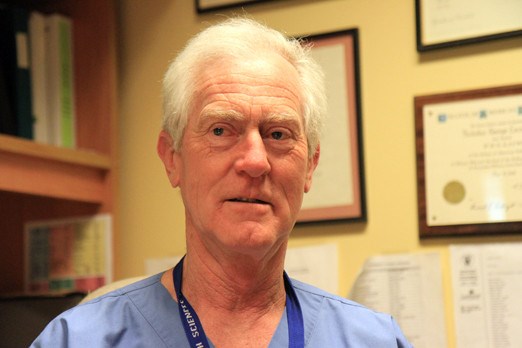Thunder Bay has had to rely on forensic pathologist Nick Escott for the past 30 years, but as his retirement looms there’s still no one ready to take his place.
Escott started his career in forensic pathology in 1984, but he has also taken up work as a gynecologist at the Thunder Bay Health Sciences Centre. He says he took on that practice because he wanted to reconnect with patients.
But at 65-years-old, Escott says he only wants to work in pathology for another five years and then retire.
“I love it,” Escott says. “The problem is I like too many other things. I’m one of the last few pathologists who do homicides and who doesn’t have a one-year fellowship in forensic pathology.
“Unless we get one of these new graduates to come to Thunder Bay then if I retire the bodies will likely be sent to Toronto. So I’m stuck with this for the time being. “
He says it’s difficult to recruit graduates to come to Thunder Bay because of the appeal of working in Toronto.
His field made some major changes following the inquiry into the way pathologist handled criminally suspicious deaths involving children.
And Escott says that inquiry has made the guidelines surrounding pathology far stricter.
“In order to do criminally suspicious autopsies you have to be called a Category A pathologist,” he says.
“I passed because of the grandfather clause but this was before the Goudge inquiry so the rules were a little bit more slack. After the Goudge inquiry with the new rules, only two of us were offered the opportunity to apply to the Category A pathology. If I didn’t do this then all the bodies that are criminally suspicious would have to be sent to Toronto. “
While Escott is the only Category A forensic pathologist in the city, there are deaths he can’t do.
Escott can’t perform autopsies on children or cases that require more expertise such as with brain injuries.
On average, Escott does about one criminally suspicious death a month but the number of autopsies he does can vary.
The decision on where a body goes is made in Toronto and then directed by the regional coroner’s office.
Regional coroner Michael Wilson says there are also two pathologists in Kenora that can do limited forensic cases, but bodies from Thunder Bay rarely go there because of the difficulty in scheduling a flight.
He says it’s much easier to get a flight to Toronto.
Wilson says they value the work Escott does in Thunder Bay and hopes his retirement isn’t too soon.
“Hopefully he’s not going to retire any time soon because that’s going to make a bit of an issue for us but obviously we’re working to recruit some fully fledged pathologists to our community,” Wilson says.
“It’s onerous to become a forensic pathologist. It’s an extra year of training after one’s full pathology residency so it’s fellowship training that in Canada I believe can only be done in Toronto.”
He says the cost to ship a body to Toronto various from where the body originates. Remote locations cost more but on average it can cost anywhere from a couple hundred dollars to several thousand.
He guessed around 10-to-15 bodies each year are transported to Toronto from Northwestern Ontario.
Thunder Bay Police Service Staff Sgt. Don Lewis says having a forensic pathologist in the city makes life much easier.
A police officer has to stay with the body to ensure the body remains intact. Lewis says the officer who stays with the body is usually the one that arrives first and discovers the body.
“When there’s a criminal element to it, there has to be continuity, which comes up in court,” Lewis says.
“When the a body is transported outside the city there has to be an officer that goes with the body in most cases if there’s a criminal element to it. If not, we have an agreement with members of Toronto police.
“The only issue is if something comes up where you have an investigation that’s going to involve some charges or some court process now you have to have the Crown’s office subpoena that officer in Toronto to come to Thunder Bay for the duration of the court proceedings.
“For dollars and cents, it would make more sense to have your own officer go there and process all the exhibits and photographs and then make their way back here to be available for the court process.”
Lewis says it gets complicated when an officer is about to take a vacation or the days fall onto a holiday. On average, the post mortem takes about a day and the officer returns back home the next day.
“It can be taxing if we get a number of homicides like in September of 2010 where we had three in three weeks,” he says. “In most cases it comes out of our budget unless there’s no criminal element to it.”
He says maybe once or twice a year an officer will escort a body where no criminal charges will be laid. In those cases, the coroner would be paying the bill.
Lewis guest the average cost to send an officer to Toronto ranged around $4,000.
He says it gets more complicated and expensive if there’s overtime involved.
